Lets face it, apart from the Buddhist monk we met eternally walking the earth with not a cent to his name, we all need money to travel around the planet. And exactly how much, depends on your lifestyle code and just how many luxouries you are prepared to give up. It also relies on how well you have planned and saved up those pennies for the once in a life-time dream trip.
The basics like food , accommodation and transport have to be paid for first and then after that it's up to you, as to how much you fork out on a bottle of wine, souvenirs and massages on the beach in Bali. Cycling around the world generally means that the transport costs are low; the accommodation can be cut enormously with stealth camping and food: well that's probably an area you'll still want to spend a bit of money on. But you can keep that down to a minimum too.
But before you start worrying about whether you can make ends meet on the road, you first have to set a date for that (loaded bike) journey. That's the key to it all. Once you have the goal, it isn't too difficult to save like mad and make it happen.
Below you'll find information from basic travel expenditure, including tricks of how to stay on the road longer, to useful anecdotes on dealing with world money and banks. There's also our own personal budget breakdown of all expenses in the countries we have visited so far. That includes food and accommodation, transport and visas and all the other luxoury items as well.
MONEY, MONEY, MONEY... TIPS FROM AROUND THE WORLD
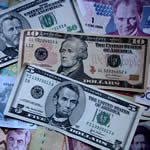
only pristine dollar bills
in Central Asia
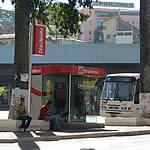
Brazil:
using
an
independently
erected
ATM booth
has its risks
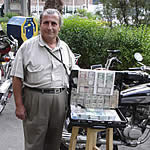
money changer at the
local market in
Iran
www.exchange-rates.org
Only pristine bills in Central Asia
In Central Asia,
it is important that your American
dollar and European euro bills
are in pristine condition. No unusual
ink marks, pen scrawlings or
small tears. Sticky taped currency
is out of the question. Banks
and exchange bureaus will simply
refuse point blank to accept them. On
one occasion we tried to convert
a $20 note into Uzbek Sum which
had a tiny biro dot on its corner.
It was otherwise, immaculate, but
was immediately rejected. The bank
clerk eventually gave in after
much pleading: reluctantly though
and at a lower exchange rate.
Also be aware that they'll have no problems dishing the shabbiest local currency back at you and often on purpose, because no-one wants them. But the fault-finding can work both ways of course and you have every right to refuse sub-standard bank notes from anyone. Although they may make a fuss, persist. You'll get what you want in the long run.
Money tips for the long term traveller: before you leave
Get to know your bank manager: this could prove very helpful
if you are out there for the long stay.
Often, the reimbursement process begins once you return
to your country of residence and if you need new cards or
pin numbers, it pays to have a personal contact within the bank.
Leave with more than one debit and credit
card. If one gets stolen, damaged or skimmed, at least you'll have another one.
ON THE ROAD
Check your bank account on-line regularly for
obvious reasons. Or, if this is not possible, have someone back
home do it for you.
Using an ATM has its risks too
these days, though it is by far
the easiest method of accessing
your money. It is best to stick
to banks with attached teller machine
areas or those with security guards.
Independently erected booths in
touristy areas are prime spots
for skimming or card reading scams.
Always cover the pin pad with your hand when typing
in your pin code. Take you receipt
with you and if there are folder
holders or any paraphernalia
hanging on the walls or near the
ATM, don't use it. Firstly, banks
don't have advertising folders
in these places and it is a perfect
place to hide a camera. If you
want to know the how's and whys of bankcard skimming,
look at the snopes.com reference
page.
Google
"ATM locator" to find
ATM's near where you are staying or travelling to.
Know the currency
conversion rate
before you enter the country. This
may sound obvious, but it
did happen to us. After
nearly four years on the road,
we both forgot to research this
detail and pedalled from one frontier
to the other. We landed in Chile
not knowing how many pesos there
were to our Bolivianos. Luckily,
there was nowhere to spend our
cash on anyway.
Use
money changers and black markets to
your advantage. If you know the
current conversion rate, then things
can't really go wrong, unless they
give you counterfeit money, but
if you have a watchful eye, you
can tell the difference. Always
be the last to count and inspect
your money. This avoids last minute
slight of hand from a Money Magician,
of which there are a few in the
world. In Turkmenistan,
you have to change your money on
the black market and not at the
bank. The official exchange
rate is as little as one fifth
of what the street value is. See Lonely
Planet for an overview of practical
money information.
Keep
a stash of back-up money ($
or €)
and a few traveller's
cheques for emergencies. In Guatemala,
every single ATM in and around
Flores was out of order, when we
arrived.
Don't
put all your money in the one place.
Spread it around so if you do get
something stolen, you aren't going
to loose it all. When
out seeing the sights, it is best
to keep your money well concealed
and preferably next to your body.
And the days of simply hiding
stuff in your sock are not completely
over. Zip
It Gear has come up with socks with
pockets. Mind you these won't help
you in the back streets of Quito
at night. Kevin Coffey, self proclaimed
"Scholar of Thievery" can
also introduce you to almost every
conceivable form of safety holder,
money belt, neck pouch and fanny
bag on the market. But personally,
I'm more of a fan of stuffing it
in the padded bra, whether your
wearing it or not or deep in the
girlie compartment of the pannier
inside one of those iridescent
wrapped sanitary pads. I don't
use them, but one in the bag makes
for a good hiding place.
NOTE: Euros or Dollar bills can be exchanged almost everywhere in the world these days.
Country specific tips for dealing in worldly cash
Each country has its own way of doing things and so it stands to
reason that you will come up against monetary peculiarities while travelling.
Here are just a few of the more prominent ones we faced on our world
cycling tour:
Iran: You can't withdraw any money, use your credit card or change travellers cheques. Receiving monetary transfers will most likely be out of the question too. But, you can exchange euros (preferably) and dollars (only bills printed after 1996) on the street and at a money exchange shops. This means take ALL your cash into the country with you. Also watch out when negotiating a price in Iran since it can become pretty confusing. The reason for this is the two currency units of the country. There is the official Rial and the more commonly used Toman: where 10 Rial equals 1 Toman. The ambiguity factor is fairly obvious, and perfect for those haggling merchants to cause confusion. Make it very clear during price barter which one you are referring to. [info: 2007]
Japan: Most banks will only accept Japanese cards, but there is an exception: the Japanese Post. Luckily they have offices all over Japan, even in the tiniest of places. But beware, because the ATM's are not open all day, every day. They can be closed on a Sunday (depending on the size of the branch) and the rest of the time, usually open from 9am to 9pm. Outside these hours, you cannot withdraw cash. [info: 2008]
Pakistan: The first chance to draw money out of an ATM when coming from the north of Pakistan is in Abbotabad. The MCB (Muslim Commercial Bank) accepts western cards. In Karimabad and Gilgit you could cash traveller's cheques and exchange Euros or Dollars. [info: 2007]
Sudan: there are no ATM's in Sudan that are connected to the international banking system. Take cash and Travellers Cheques. Cash can best be withdrawn in Aswan in southern Egypt, before you hit the ferry to Wadi Halfa. [info: 2011]
Turkmenistan: You should change your money on the black market and not at the bank. The official exchange rate is as little as one fifth of what the street value is. [info: 2007]
Uzbekistan: Accommodation for foreign travellers is quoted exclusively in American dollars. Hotel Uzbekistan at the end of Kharmza Street in the CBD of Tashkent is one of the most reliable ATM sources in the capital. It dishes out both dollars and soms, but go earlier rather than later in the day: the machine does run out of cash on occasions. [info: 2007]
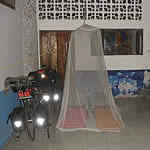
camping in a police station
in Baja California, Mexico
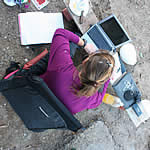
working while you travel: campground office
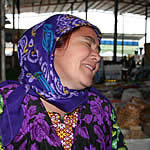
Turkmenistan: market
shopping is normally
cheaper and a great way of getting to know the locals
Now I have to admit, while we have managed to successfully stay on the road, we haven't actually managed to stick to our original budget. In fact, we spend way too much and that is simply because, we don't always abide by the low budget travel guidelines below. Maybe you can?
Accommodation and transport
Wild camp or ask to pitch the
tent at a farm, church, school, police station or any other community area.
Use Couchsurfing, Warmshowers or
the Hospitality Club regularly.
Find accommodation that includes breakfast in the price.
Stay in hostels not just because they are cheaper, but because you
can network with other travellers. This way you can share the cost of taxi's, boats,
tour guides and other travel activities.
Take public transport or walk, when not cycling.
Money matters
Keep a record of your purchases.
There is no better way to see where the money is going.
Use banks with no withdrawal fee.
Only take out your budgeted amount each week.
Once that is depleted that's it.
Work a bit while you travel. As much about travel as it is
about working abroad The Working
Traveller Magazine is a supplement
guide to the Overseas
Job Centre website.
Food and general living
Eat in cheap local cafes instead
of the more touristy ones.
Become price aware. Wander around
the supermarket to get an idea of how much things cost & to
put the cost of living in perspective. This way you won't get ripped off
at markets or places where prices aren't set.
Buy local, seasonal products that
the general population uses. These
are usually cheaper. Stop and buy farm produce along the way.
Eat nature's food. Look around
when you are cycling down the road. Some countries have plenty
of wild fruit and nut trees. Others have trucks so overloaded with
vegetables they are scattered roadside.
Don't buy water, filter your own and
instead of eating out, self cater. A visit to the
supermarket or market is also a cultural reward.
Learn the art
of bartering [from The Adventures of D].
It is not only a means of saving money but a way of socialising too.
Limit the luxoury items like
booze and tourist restaurants and use them as a special treat instead.
Re-evaluate the importance of souvenirs and
buying new gadgets. Before making a purchase, ask yourself
three times over if you really need or want it. You have
to give an honest answer for this money saving technique to work.
Ask locals what they normally do for
entertainment. You'll probably get invited if you show an interest in
their country's culture.
Research before you leave and during
your travels The world wide web is a great place for
picking up tips on things to do and ways to save money.
Recycle and repair everything.
Learn about your own bike maintenance & repairs:
You need go no further than BicycleTutor.com
BUDGETTING FOR THE WORLD TRIP
Just a question
of money
So, how did we do it?
We worked long and hard for
a solid three years...
While saving one of our salaries,
we purchased only things needed for
our trip. If anything else broke
down, we did without.
It was amazing how the bank account
grew in those three years.
We sold everything. A fridge and washing machine are hardly items you can lug around the world with you and they would just rust and grow cobwebs in storage for the length of our 5-odd year bicycle trip. After that, who knows. That's something to think about when the time comes.
So, how do
we do it?
In the meantime, we hadn't
actually planned to work, but hey
if there's one thing we have learned
over the last few years of travel:
plans change. We have built a few
websites. See www.sonali.tk -
justifiable web design, which we
hope will keep us going into the
future. Sonya has written a few travel
articles here and there and we get
a bit from the advertising and sales
from this website.
Occasionally someone thoughtful comes along and donates some money to our adventures. Mostly those appreciative of all the work we put into informing the general public about loaded bike touring. If you feel similarly inclined then feel free to make a donation...
Any amount is special. It will help us live our dream just that little bit longer. Thank you.
Each month our bank account is plundered. And apart from once incident in Brazil, only by ourselves. Thank goodness!
So, how much exactly?
From the armchair support of our computer stools, we figured we would need an average of € 25,00 per day.
That was quite an under-estimation and below you can see why. But, you also have to remember, we are the world's worst for sticking to the budget guidelines. We like to eat good food, have a drink or two and we are unhealthily attached to any electronic gear. Changes in plans also meant more flights and ferry rides and you know the old story: it all adds up.
So again: how much exactly?
THE BREAKDOWN OF THE BUDGET
Daily expenses for two
(food & accomm.)
Iran
Turkmenistan
Uzbekistan
Kyrgyzstan
China
Pakistan
india
Nepal
Malaysia
Singapore
Thailand
Japan
South Korea
Canada
USA
Mexico
Guatemala
Belize
El Salvador
Honduras
Nicaragua
Costa Rica
Panama
Colombia
Ecuador
Peru
Bolivia
Chile
Argentina
Uruguay
Brazil
Germ. / Holl. / Belg.
France
Italy
Tunisia
Libya
Egypt
€
18
8
18
16
22
14
18
22
23
44
28
31
29
35
28
23
19
33
21
24
18
28
23
25
24
17
22
32
25
37
25
37
18
35
29
13
bus trips, doctors, dentisits, electronics, visas...
new photo camera, visa Turkmenistan & Uzbekistan
entry tax
visa Pakistan, China, Kyrgyzstan
new lens for camera
Indian visa, parcel to Australia, hard disc drive
glasses, periodontist visit, mri scan, parcel, taxi
flight to Malaysia, parcel, major bike maintenance, visa, watch
flight to Japan, periodontist, taxi airport
3 ferry trips, electronics
flight to Canada, HDD, camping gear, clothing, parcel
bike repairs, clothing
bike repairs, clothing, electronics
ferry, dentist visit, computer+import tax, bike repairs, glasses
visiting Tikal by bus
2 boat trips, 2 dinners
eating out in restaurants twice in three days
entry and exit tax
boat trip to Colombia, electronics
bike repairs, clothing, electronics
insurance, HDD, postage, Spanish lessons, injections
parcel, bike repairs, taxi
bike parts and repairs
bus tickets, clothing, electronics
new photo camera, bus ticket, ferry, clothing
electronics
flight to Germany, bus ticket
computer, eating & drinking out, bike repairs, periodontist
insurance, ferries, clothing, bike repair, meeting up with friends
ferry crossings
visa's Libya, new mice computer
new camcorder
42.09
9.88
28.12
16.51
36.00
17.97
21.08
41.15
22.93
43.87
39.66
39.67
79.82
40.02
35.64
28.61
25.58
47.46
21.59
30.67
20.30
28.10
53.21
25.80
54.27
18.58
25.99
35.09
41.49
39.16
39.06
64.91
32.46
54.00
30.47
30.56
country
28
6
27
18
21
52
107
48
23
5
58
37
32
40
90
161
6
5
7
3
5
12
18
59
34
59
20
46
44
10
95
34
74
14
38
14
- insurance
- flights, ferry crossings, visa's and bike repairs (itemised individually underneath)
- purchasing quite a lot of new electronic equipment - 2 computers, 2 camera's, 3 HDD's
(see electronics review page for details on our gear).
We also earned some money while we were on the road. Building websites, doing translations, writing stories and advertising on this site, which took our average expenditure down to just above € 30 a day.
Flights
Up, up and a away: Air travel between continents and countries set us back the following amount of money (price for 2 people in euros):
Nepal - Malaysia
Thailand - Japan
South Korea - Canada
Brazil - Germany
one-way (FlyYeti on
wikipedia)
one-way (China
Airlines)
one-way
(Air
Canada)
one-way (Condor)
total flights (in euro)
428
617
1284
1162
3491
Want to know how to get your bikes on the airplane? See our travel tips page.
Ferries and boats
Just pay the ferryman: (prices for two people in euros)
Wakayama - Tokushima (Japan)
Matsuyama - Hiroshima (Japan)
Shimonoseki (Japan) - Busan (South Korea)
Tsawwassen - Sidney (BC, Canada)
Nanaimo - Vancouver (BC, Canada)
La Paz - Mazatlan (Mexico)
Portobello (Panama) - Cartagena (Colombia)
Buenos Aires (Argentina) - Colonia (Uruguay)
Marseille (France) - Bastia (Corsica, France)
Bonifacio (Corsica) - Santa Teresa (Sardinia)
Olbia (Sardinia, Italy) - Civitavecchia (Italy)
Civitavecchia (Italy) - Tunis (Tunisia)
Nankai Ferry Co.
Setonaikaikisen
Kampu Ferry Lines
BC Ferries
BC Ferries
Baja Ferries
Sailing Koala
Buquebus
SNCM
Saremar
SNAV
Grandi Navi Velochi
total boat trips** (euros)
32
41
140
20
20
150
* 400
48
130
36
49
213
1391
* The boat trip between Panama and Colombia
cost US$ 375 per person.
That's including accommodation, food and water for 5 days. We deducted
our average daily spending in Panama from the total price of the trip.
Our 'boating only' price tag = € 400 for the two of us (where € 1 = US$ 1,40)
**
Over the last
years, we took
a total of
42 boat / ferry
trips.
We've only
mentioned the
most expensive
(and longer)
ones here.
At a wild guess,
the others would
have cost us
another € 200
euro.

view
over the Himalayas
as we flew
out of Nepal

we were hoping
that
the ferry was in better
condition than the signpost
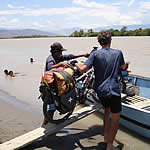
one of those
shorter,
wilder boat trips across
the Rio Marañón
near
Bellavista in Peru
Bike repairs and maintenance
2007
2008
2009
2010
Tubus rack, new tyres, tubes, chain (Turkey)
new wheels, crank sets, pedals, chains, cassettes (Nepal), bottom brackets, Ergon grips, wheels re-spoked, (USA), tyres, pump (Mexico)
new cassette, crankset, chain, tyres (Mexico), headset, deraillers, tyres, tubes (Colombia), cassette, crankset, chain (Peru), bike pump, shifters, tyre, axle (Bolivia)
wheel repair, new rear wheel, maintenance, cassette, crankset (Brazil), new rear wheel, pump, tubes (Holland), headset repair, tyres, tubes (France)
total bike repairs and maintenance for both our bikes (euros)
165
584
269
450
1598
Find out where the bike shops are in the world by going to our country information pages.
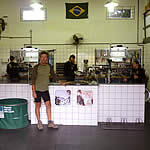
Biketech
Curitiba, Brazil
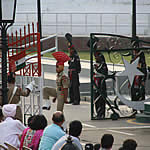
India and Pakistan:
also referred to as
the Berlin wall of Asia.
Anything but a simple affair
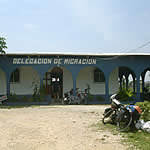
Bethel in Guatemala:
a very
simple border crossing
in
every way possible
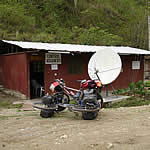
La Balza Border
crossing
between Peru and Ecuador:
we weren't sure if this was
actually
the right place to be
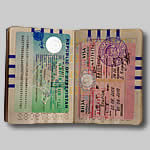
every country
is only a
stamp away: some
prettier
than others
Travelling the world requires getting all kinds of visas and especially so if you plan on going through Asia. And getting that stamp in your passport comes with a price tag. The cost of a visa depends entirely on what passport you're carrying with you.
A
couple of classic examples which show
the enormous difference between countries:
In 2007, US citizens paid US$
100 for a Pakistani visa, whereas
Dutch citizens paid just US$ 36.
Travellers with German or French
passorts don't pay to get
in to Turkey, we paid € 10,
Canadians pay
€ 45... So far, travelling on a Dutch passport,
this is what our world visa's have
cost us. (prices per person)
Country
ASIA
Turkey
Iran
Turkmenistan
Uzbekistan
Kyrgyzstan
China
Pakistan
Pakistan
visa ext.
India
Nepal
Visa cost per person:
€ 10
€ 50
US$ 36 (7 day
transit visa)
US$ 75 + LOI €26
+ admin cost € 2
US$ 55
US$ 80
US$ 36
free of charge
PKR 3300 = € 31
US$ 30
Asia
per person € 397
Where it was obtained
Greek/Turkish
border; immediate
Istanbul (Turkey); 2
weeks
Tehran (Iran);4 days
Tehran (Iran),
Letter of Invitation (LOI)
via
Stantours, admin cost
at embassy; same day
Tashkent (Uzbekistan); same day
Tashkent (Uzbekistan),
US$ 80 = 1day ;
US$ 60 = 3
days;
US$ 40 = 5 days
Tashkent (Uzbekistan); 4 days of returning to
the embassy
Islamabad (Pakistan); 4
days
Islamabad (Pakistan); one week
India/Nepal
border (Banbasa / Mahendranagar);
immediate
US$
= € 0,71
(October 2008)
US$ 6
US$ 22
North
America pp € 20,50
Canadian/US border (Visa
Waiver Program)
procedure : USA
online application
US/Mexican border Tijuana; immediate
US$
= € 0,74
(May 2009)
US$ 3,75
US$ 3
US$ 10
Centr
America pp € 12,00
conservation tax when
leaving the country by boat,
otherwise (by land/sea)
an extra US$ 15
Belize immigration
ofiice in Punte Gorda:
entry
visa free; immediate
El Salvador/Honduras
border: entry tax; immediate
Honduras/Nicaragua
border:
US$ 5 tourist card,
US$ 2
immigration fee (entry); immediate
Nicaragua/Costa Rica border:
US$ 1 council tax,
US$ 2
immigration fee (departure)
US$
= € 0,70
(June 2009)
SOUTH AMERICA
BOB 21,00
South America pp € 2,00
Ollagüe border; exit tax Bolivia
US$ = € 0,71 (December 2009)
MONEY NEWS UPDATES
August
16, 2007 money update
www.sonali.tk keeps
www.tour.tk on the road
Not only are we
looking for possible sponsors &
advertisers on our site, we are
working a bit too!
Having acquired a taste for building
websites in the Netherlands, we
are now looking beyond borders
as easily as we are crossing them.
Everybody should be able
to own their own website if they
want to, regardless of their wealth.
That's what we call justifiable
web design.
Please visit our website at www.sonali.tk to see what we have done around the globe so far. And if you are interested in having your own website at a very competitive price, then get in touch with us at info@sonali.tk
February 2009 money updateA new year, a new beginning.
The tour.tk site has had a major overhaul and looks even better than it did before. After talking to several experts in the field, we decided to give advertisement another try. We also decided to expand our other websites and try our luck with placing adverts there too. Who knows, we might be able to stay on the road a bit longer after all...
We have build our own shop via Amazon: our bicycle touring & outdoor shop. We pocket a small percentage of everything sold here. Furthermore, all the books mentioned on the site are for sale via Amazon. Same deal: a bit of revenue goes to www.tour.tk.
The GoogleAds earn us a bit of cash on a click-through basis.
December 2009 money updateWe are now selling our photographs on the web via a few stockphoto sites! It is a lot of work and we spent quite a few hours tapping away when we were in Santiago, but we now have about a hundred+ photos on 3 different sites. Our first submissions to Shutterstock are selling at around 40 photos a month. That gives us the whopping extra income of around US$ 10 per month! Not too much, for all the time outlay, but once they're on, you don't have to do anything but wait until the cheque comes in.
We hope to put a lot more pictures up for sale soon. Other stockphoto sites we like and use are Depositphotos & Dreamstime.

